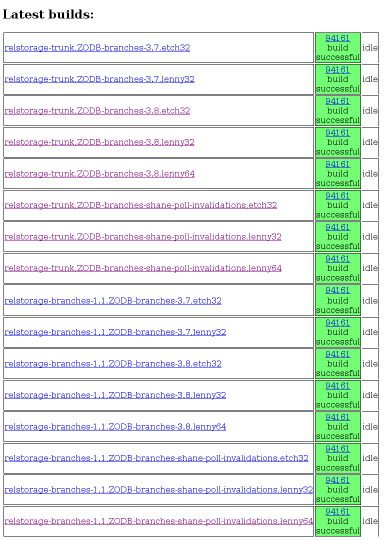I said earlier that before I release RelStorage 1.1, I wanted to set up thorough automated testing of RelStorage with different combinations of ZODB versions, RelStorage versions, Python versions, and platform types. I originally intended to use hand crafted scripts to run the tests, but this past week I learned Buildbot’s model through experience working on a customer’s Buildbot configuration, so now I’m comfortable with it and I decided to use Buildbot after all.
Here are the results.
I could just say all the tests are passing, but it only feels real when there is a table with many green cells and no red cells. This system tests a lot of software combinations. There are three platforms: 32 bit Debian Etch, 32 bit Debian Lenny, and 64 bit Debian Lenny. On each platform, I’m testing the RelStorage trunk and 1.1 branch combined with ZODB 3.7, ZODB 3.8, and the ZODB shane-poll-invalidations branch, except that the 64 bit platform with Python 2.5 does not test the ZODB 3.7 branch, since ZODB 3.7 is not compatible with 64 bit Python 2.5. Each 32 bit platform runs tests with MySQL, PostgreSQL, and Oracle. The 64 bit platform runs only the MySQL and PostgreSQL tests.
That adds up to 44 tested combinations, all passing. I can relax now! My Buildbot is running on a private server, but I can expose a read-only web view if there’s interest.

Wow, that’s nice! However the one thing that’s blocking me from using RelStorage is that it doesn’t work with BlobStorage proxy or support ZODB blobs by itself. Are you planning on implementing ZODB blob support for RelStorage?
It doesn’t work with the BlobStorage proxy, huh? Ok, I’ll have to look into that.
Yep, when I tried to research that it appeared that it creates a new instance of storage without any proxies on some binding method, so it loses blobstorage proxy as well. I don’t know much about ZODB and RelStorage, so I can’t provide much info on that.
Oh silly me, of course that would be a problem. I’ll start thinking about the best solution.